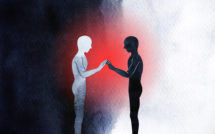

German author Esther Dischereit is currently residing in the United States. This is the last in a series of three letters, in which she describes the mood in the country under President Trump.
Translated from the German by Linda Frazee Baker.
I met Mickey on the Chicago River. “Kiss me, I’m Irish,” said her T-shirt. Her husband, John, a programmer, says that St. Patrick’s Day has become a kind of public event. The Asian-American family on their block was also there with their children. After the parade, groups of people thronged the streets, drank beer, and were wearing the greenest possible outfits, an allusion to the shamrock, the national symbol of Ireland.
Mickey, who works in a bank, says she feels profoundly unmoored. She doesn’t have the slightest idea what will happen tomorrow. And that is an attitude toward life that bothers her. “It didn’t used to be like this,” she says. Diagonally across the street, the President’s name has been mounted in enormous letters on his tower. Attempts to remove it by legal means have failed. A disgrace, John’s daughter said when she came home from college. She was close to tears.
It is truly strange that my neighbor keeps going out again and doing the shopping and so on, but every day she too thinks about it and about how she is being governed. You asked me what has changed now? Nothing and in fact everything.
Ulrich Baer, Professor at New York University, wrote an article in which he said that freedom of speech must reach its limits where openly racist or anti-Semitic hate are concerned. In the local context this was an unheard-of intervention. Freedom of scientific and academic work could also be restricted if a hate-filled rabble rouser like Richard Spencer were to be denied access to a university campus. The New York Times had to shut down its comment space after over a thousand entries.
Many people who consider themselves as political opponents contribute money to the American Civil Liberties Union (ACLU), so that civil society can hire lawyers and conduct lawsuits. This organization has received more than 83 million dollars in donations, and its membership has multiplied. But the ACLU has also undertaken to defend hate groups with the justification that, as a matter of principle, they too should have the right to be able to represent their views in Charlottesville without restriction.
The idea that freedom of opinion must be defended is taken very far in the USA. At the time, the justification was that representing one’s opponent is honorable and praiseworthy. On the other hand, the ACLU has taken a case that concerns the discrimination against women who have to stay in a marriage to avoid losing their health insurance.
Recently, I saw Alexandria Ocasio-Cortez, the young Democratic representative and bringer of hope who is viewed as radical, on the side of a wall: a mural in the style of “La Pasionaria,” the revolutionary from the Spanish Civil War.
“I love immigrant America.” Or “Make America America again.” In ever-new creations text writers make buttons like the one that says, “When nobody knows what’s wrong with Trump, I don’t know either and I can’t explain it.”
More often than ever, a discussion is taking place as to whether socialism should be a goal or whether it is a disgrace. Bernie Sanders is the person who advocates making the word socialism respectable again. These debates lead to questions about taxing the wealthy, health insurance, and long overdue criminal justice reform.
Or they lead to the question of access to education. This is becoming ever more difficult for elementary school students with African American or Hispanic background. For example, the results for next year’s class at Stuyvesant High School in New York are that 895 students were accepted, 587 of Asian descent, 194 white, 33 Latinx, and 7 black.
Even in the Bronx, the situation is in principle exactly the same, although black people form the largest share of the population, with 36 percent. It’s no different in Brooklyn: of the 1,825 students accepted into an elite high school, 95 are black. Well-off parents pay for private tutoring long before the entrance exam so their children will pass the test. The result is that black and Latinx children are left waiting outside the door.
The perception of Native Americans, however, is changing little by little. The Chicago Steppenwolf Theater has an announcement read out loud before the play begins. The building, the institution itself, has been erected on territory that belonged to the tribe of the Three Fires. Who were driven out 200 years ago. Nevertheless, one must be conscious of the fact that more than a dozen other tribes hold meetings here and that over 100,000 tribal members remained in the state of Illinois. The Theater wants to show respect and say thank you to the tribe for their right to hospitality. And to announce that they belong to a group of people who illegally appropriated the land.
And Trump? Sometimes I have the impression that people are tired of hearing the news about the President.
Esther Dischereit, described by her publisher, Suhrkamp Verlag, as “possibly the preeminent German-Jewish voice of the post-Shoah generation,” lives in Berlin. She has published fiction, poetry and essays, as well as plays for radio and the stage. She is the founder of the avant-garde-project WordMusic and has worked as a curator for various projects in contemporary art/new media. Most recently she published “Flowers for Otello. On the crimes which came out of Jena,” a book and performance-project where her topic is a series of killings against mostly Turkish immigrants which took place in Germany between 1998 and 2011. She served as Chair for Contemporary Poetics at NYU in 2019.
Linda Frazee Baker is a writer and literary translator living in New York. Her fiction and creative nonfiction have appeared in the Michigan Quarterly Review, Drunken Boat, Sakura Review, and Folio. Her translations of German literature have been published in The Guardian, WebConjunctions, Asymptote, Metamophoses, InTranslation, and the Brooklyn Rail. She holds a master’s in fiction from Johns Hopkins.
This article was originally published in German in Deutschlandfunk Kultur on April 24, 2019 and has been slightly revised. It is reprinted with the kind permission of Deutschlandfunk Kultur.
Photo: NEW YORK Alexandria Ocasio-Cortez speaks during the National Action Network Convention on April 5, 2019 | Shutterstock
Published on May 10, 2019.




